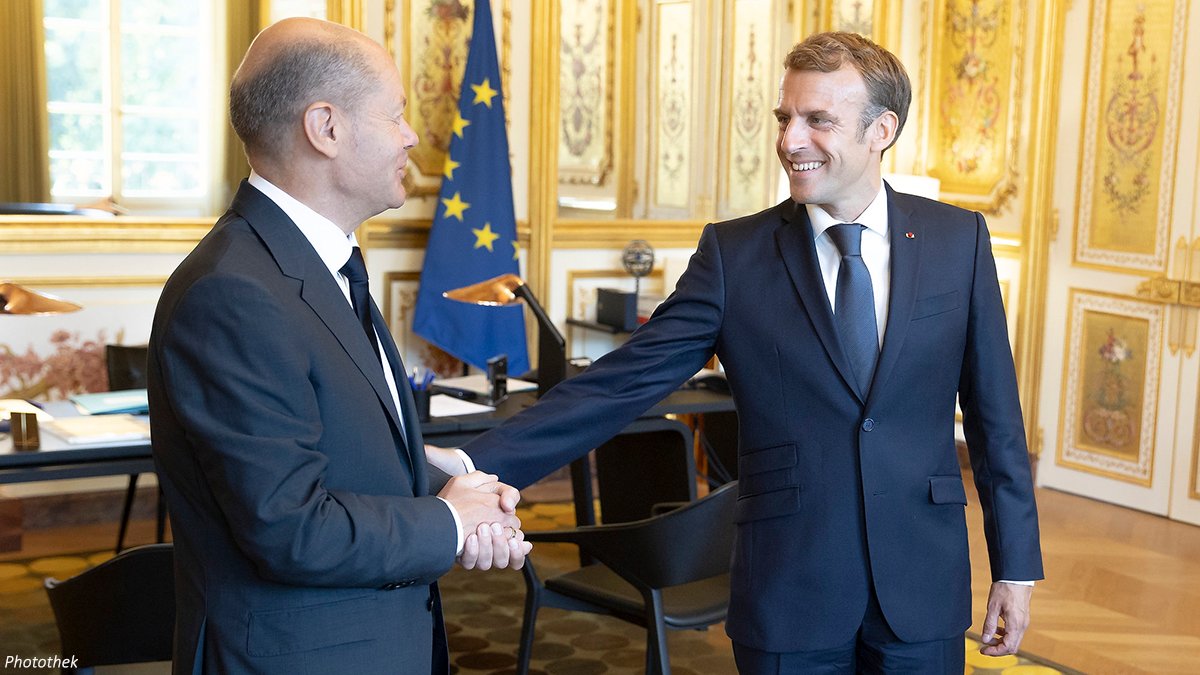Because in Germany Macron’s re-election is celebrated

The German political and productive world breathes a sigh of relief at Emmanuel Macron's victory in France. Here's how and why. Pierluigi Mennitti's article from Berlin
The German political and productive world breathes a sigh of relief at Emmanuel Macron's victory in France. Despite the predominance of news on the war in Ukraine, in recent days the space dedicated to the ballot in the neighboring country had grown in the media, with which Berlin shares a sort of tandem in the leadership of the EU.
A combination that in recent times has known more disappointments than enthusiasm, above all for the coldness with which Angela Merkel's Germany accompanied the accelerations of the French president on Europe. But even the good intentions of collaboration of the new Chancellor Olaf Scholz have not so far translated into concrete programs. And now the Russian war has come to complicate political agendas.
But the chorus of newspapers this morning highlights a cautious satisfaction with a vote of continuity: in the face of the already too many problems of this phase, at least another front is not opening in the West. The caution is due above all to a series of elements that all the newspapers do not fail to highlight in their comments: the however robust consensus obtained by Le Pen, the fact that 40% of the French have shown themselves sensitive to the sovereign appeal and that the country is practically split into two large fields.
"Today Berlin and Europe need not fear that a President Le Pen could ally with Viktor Orban to disintegrate the Union, but no one can be under the illusion that nothing has happened", comments the regional daily Badische Zeitung , particularly attentive to French political developments in what was published in one of the neighboring Land: "The fact that a member of the far right has almost become president of France must make us think, the future of the EU hangs by a thin thread".
This is the common thread of German interpretations, beyond the sigh of relief. The Frankfurter Allgemeine Zeitung speaks of a "radiant loser", commenting on the defeat of Le Pen, and the 17 points of detachment between the two, which should not be underestimated since it is a re-election that is always complicated, must not deceive: the leader of the right he obtained his best result with over 40%.
The Frankfurt daily corroborates its thesis by sifting through the electoral data: a first analysis of the results shows that the country is clearly divided by income levels. 77% of senior cadres and 68% of retirees voted for Macron, 67% of workers voted for Le Pen. According to the electoral institute Ifop, among small employees and traders, the figure was 57%. Macron is the French senior candidate, he got 71 percent of the votes from over 70. Le Pen was particularly strong in the 50-59 age group (51%). "In 2017 Macron was a beacon of hope, now he wears the invisible scars of the crises that have marked his mandate", concludes the Faz, "and in mid-June there will be the legislative".
Even for the Handelsblatt , "although the nightmare scenario has been thwarted, the problems remain all: the right is stronger than ever". The commentary on the vote does not neglect the aspects in favor of the reconfirmed president: the majority of the French decided "against economic and social isolation", Macron beat Le Pen more clearly than expected, he got a second term, which had not happened since 2022 with Jacques Chirac. Furthermore, "Macron has pushed France forward with economic reforms and many of his compatriots have benefited from the development". Its "unwavering commitment to a strong and independent Europe on the world stage is the right answer" to global upheaval. In short, Macron's re-election "is good news for Germany and the EU". Yet, concludes the Handelsblatt, "the relief for the positive outcome must not hide the fact that France is deeply divided": Macron 2.0 could be a more uncomfortable partner for Germany, "its margin of maneuver in the second term it is limited and its willingness to reform threatens to vanish under internal political pressure ”.
Almost the same unanimity of opinions on the political level, with the exception of the Afd nationalists, who share programs and paths with Marine Le Pen (and other representatives of European sovereignties). Satisfaction spread among the exponents of the majority, from the Social Democrats to the Greens, to the Liberals.
The chancellery wanted to underline with an official statement that Olaf Scholz was the first foreign head of government to congratulate Macron by telephone on the victory. The message delivered was institutional: continuation of close cooperation between the two countries in the face of current crises, starting naturally with the Russian aggression in Ukraine and the promise of a quick face-to-face to agree on common European and international issues.
For Friedrich Merz, leader of the post-Merkel CDU, Macron's confirmation offers the possibility of a new restart of Franco-German collaboration on the European scene. This is also believed by the president of the European Commission of the Bundestag, the green Anton Hofreiter, for whom the French president can now count on a much more proactive German government in European policies.
Hofretiter underlined how Angela Merkel has in the past actually snubbed all the Macronian proposals for European reform, while in her second mandate she will find a constructive side in Berlin.
This is a machine translation from Italian language of a post published on Start Magazine at the URL https://www.startmag.it/mondo/perche-in-germania-si-festeggia-la-rielezione-di-macron/ on Mon, 25 Apr 2022 08:04:52 +0000.
